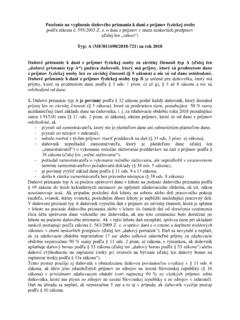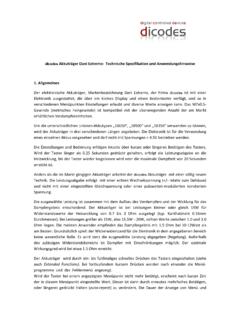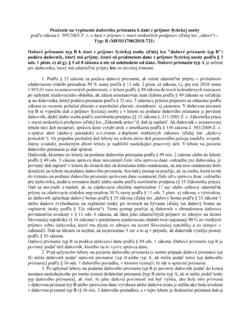Transcription of Suresh Naidu, Dani Rodrik, and Gabriel Zucman1
1 Economists for Inclusive Prosperity | Economics for Inclusive Prosperity: An IntroductionEconomists for Inclusive Prosperityec nfipRESEARCH BRIEF | January 2019 Economics for Inclusive Prosperity: An Introductionincentives, norms, socialization patterns often mitigates against adequate engagement with the world of policy, especially on the part of younger academic economists. We believe the tools of mainstream economists not only lend themselves to, but are critical to the development of a policy framework for what we call inclusive prosperity. While prosperity is the traditional concern of economists, the inclusive modifier demands both that we consider the whole distribution of outcomes, not simply the average, and that we consider prosperity broadly, including non-pecuniary sources of well-being, from health to climate change to political rights.
2 The policy briefs that accompany this overview offer a range of policy recommendations, drawn from labor economics, public economics, international economics, financial economics, Importantly, we hope this collective effort amounts to more than a discussion of specific policy prescriptions in different domains of economics. Our claim is that there are overarching themes and commonalities that taken together provide a coherent overall vision for economic policy that stands as a genuine alternative to the market fundamentalism that is too often (and in our view, wrongly) associated with mainstream economics. We strive for a whole that is greater than the sum of the shall discuss these broader themes and the connecting narratives that emerges later in this essay.
3 We begin by discussing in greater detail the motivation behind the project and the role that we see economics in crafting an alternative to the status quo. BackgroundWe live in an age of astonishing inequality. Income and wealth disparities between the rich and the poor in the United States have risen to heights not seen since the gilded age in the early part of the 20th century, and are among the highest in the developed world. Median wages for American workers remain at 1970s levels. Fewer and fewer among newer generations can expect to do better than their parents. Organizational and technological changes and globalization have fueled great wealth accumulation among those able to take advantage of them, but have left large segments of the population behind.
4 Life expectancy has declined for the third year in a row in 2017, and the allocation of healthcare looks both inefficient and unfair. Advances in automation and digitization threaten even greater labor market disruptions in the years ahead. Climate change fueled disasters increasingly disrupt everyday life. Greater prosperity and inclusion both seem attainable, yet the joint target recedes ever is a time when we need new ideas for policy. We think economists, among other social scientists, have a responsibility to be part of the solution, and that mainstream economics the kind of economics that is practiced in the leading academic centers of the country is indispensable for generating useful policy ideas.
5 Much of this work is already being done. In our daily grind as professional economists, we see a lot of policy ideas being discussed in seminar rooms, policy forums, and social media. There is considerable ferment in economics that is often not visible to outsiders. At the same time, the sociology of the profession career Naidu, Dani Rodrik, and Gabriel Zucman12 Economists for Inclusive Prosperity | Economics for Inclusive Prosperity: An Introductionthink tanks have monopolized the banner of economics in policy circles, pushing the view that there is a steep efficiency-equality trade-off, and normatively prioritizing economic growth.
6 Students who do not pursue further training leave undergraduate courses thinking that economics means that markets always work . Conservatives tend to deploy economics as a justification for preferred policies, while liberals are seen to be insensitive to the requirements for prosperity. But our own take goes beyond this common view and is substantially different from it. Many of the dominant policy ideas of the last few decades are supported neither by sound economics nor by good evidence. Neoliberalism or market fundamentalism, market fetishism, etc. is a perversion of mainstream economics, rather than an application thereof.
7 And contemporary economics research is rife with new ideas for creating a more inclusive society. But it is up to us economists to convince their audience about the merits of these claims. That is why we have embarked on this project. The initial set of policy briefs that accompany this introduction is our first step. We hope they will stimulate and accelerate academic economists sustained engagement with creative ideas for inclusive Economics is an ally of inclusive prosperityHow do we square non-economists perception with our claim that economics is part of the solution? Economists study markets (among other things) and they naturally feel a certain pride in explaining the way they operate to those who lack their specialized knowledge.
8 When markets work well, they do a good job of aggregating information and allocating scarce resources. The principle of comparative advantage, which lies behind the case for free trade, is one of the profession s crown jewels both because it explains important aspects of the international economy and because it is, on the face of it, so counter-intuitive. Similarly, economists believe in the power of incentives, because they have evidence people respond to incentives and they have seen too many well-meaning programs fail on account of not having paid adequate attention to the creative ways in which people behave to realize their own goals.
9 Why we are doing thisThe idea for this initiative developed following a workshop that the three of us attended during the first half of 2018. It was one of those multi-disciplinary meetings that have become increasingly common recently, on new thinking beyond neoliberalism and similar themes. The organizers had brought together historians, political scientists, sociologists, and legal scholars alongside economists. As is usual in such meetings, participants agreed that the prevailing policy framework had failed society, resulting in monumental and growing gaps in income and wealth. All of us were horrified by the illiberal, nativist turn our politics had taken, fueled in part by these chasms.
10 There was consensus that we needed to develop a genuine alternative a set of policies that were both effective and inclusive, responding to legitimate grievances without sowing deeper societal divisions. Any economist who sits in such a meeting will eventually find himself or herself on the defensive. For in the eyes of many, the turn towards neoliberalism is closely associated with economic Leading economists such as Friedrich Hayek and Milton Friedman were among the founders of the Mont Pelerin Society, the influential group of intellectuals whose advocacy of markets and hostility to government intervention proved highly effective in reshaping the policy landscape after 1980.








